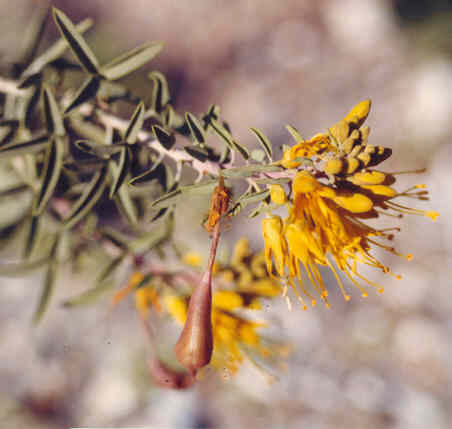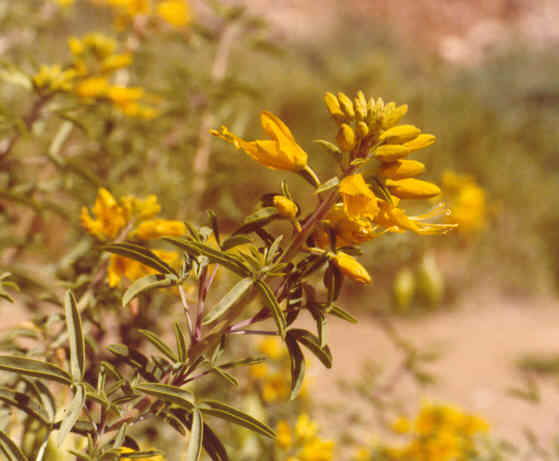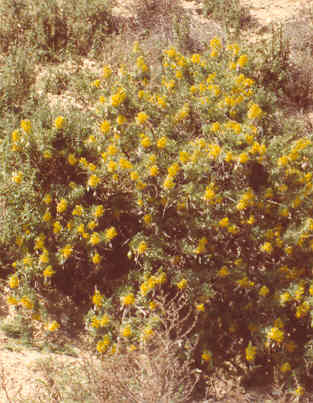
Isomeris arborea Nutt.
=Isomeris arborea var. globosa
Capparaceae
(Caper Family)
Native
Inflated Bladderpod
Bladderpod
 |
Isomeris arborea Nutt.=Isomeris arborea var. globosaCapparaceae
(Caper Family)
|
February Photo
Plant Characteristics:
Ill-scented widely branched glaucous puberulent shrub, rounded, erect,
6-15 (-25) dm. high; petioles 0.5-2 cm. long; lfts. oblong to oblong-elliptic,
1-3.5 cm. long, 0.3-0.8 cm. wide, entire, the uppermost sometimes solitary;
racemes mostly becoming 3-15 cm. long, the green bracts simple, to ca. about 1
cm. long; pedicels 6-12 mm. long; calyx 6-8 mm. long; petals 10-16 mm. long;
stipe 1-2 cm. long in fr., stout, recurved; caps. 2-3 cm. long, abruptly
narrowed at both ends; seeds smooth, 6-7 mm. long.
Habitat:
Frequent in sub-saline places, such as coastal bluffs and stabilized
dunes; Coastal Sage Scrub from s. Calif. and to w. Fresno and e. Monterey cos.
Flowers most of the year.
Name:
The generic name is from the Greek, isos,
equal, and meris, part, describing the
equally divided pod. The
species name is derived from the Latin from "tree" referring to the
tree-like habit of the shrub. (Dale
89).
General:
Common in the study area. Photographed on the Castaway's Bluffs and on
North Star Beach. (my comments).
Another common name is Burro Fat given because of its strong odor.
Barrows (1900) reported the pods of this plant were a source of food for
the Cahuilla Indians, inhabitants of the Colorado Desert, the San Bernardino and
San Jacinto Mountains; the pods were gathered and cooked in a small hole in the
ground with hot stones. Curiously,
the bladderpod has been entirely forgotten by modern Cahuilla as a food source.
(Bean and Saubel 79).
The only species in the genus. (Dale
89). Vars.
angustata, globosa and insularis
are indistinct, the varieties were recognized on fruit variation that may be
loosely correlated with geography. (Hickman,
Ed. 471,1334).
Delfina Cuero, a Kumeyaay or Southern Diegueno Indian, made the following
comment about Isomeris arborea in her
autobiography: "We eat flowers
after they are cooked and drained several times to remove bitterness."
(Shipek 92).
Text Ref:
Dale 89; Hickman, Ed. 470; Munz, Calif.
Flora 207; Munz, Flora So. Calif.
330; Roberts 17.
Photo Ref:
Feb 1 83 # 20A; Feb 2 83 # 19; March-April 83 # 6.
Identity: by R. De Ruff.
First Found: February 1983.
Computer Ref: Plant Data 209.
No plant specimen.
Last edit 3/1/05.
 |
 |
March Photo April Photo